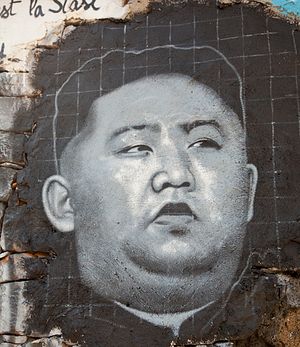Kim Jong-un is not planning on giving up his rule of North Korea anytime soon. Having achieved another successful nuclear test, and successfully launching a theater ballistic missile from a submarine, Kim capped his summer by reportedly executing his Vice Premier Kim Yong-jin for slouching during Kim’s speech at 13th Supreme People’s Assembly this past June.
The annual summer military exercises between the United States and South Korea elicited the usual rhetoric from the Pyongyang regime, including the threat to attack Seoul with nuclear weapons. Described in defense terms as a response to a North Korean attack, the war games usually end with the reunification of the peninsula. But a growing chorus of voices think that internal collapse is more likely.
In the event of collapse, there are several issues that will have to be thought through, none of which are simple. First and foremost is the Chinese reaction. In any scenario in which the North Korean regime falls, many of its former subjects will head across the Yalu River. Beijing already sits uneasily on its relationship with its western minorities; with several million ethnic Koreans already living in China, Beijing fears another problem in borderlands, this time in its northeast. This potential trouble spot is much close to the growing middle class in Beijing, and it would be much harder to contain reports of repression. Chinese Koreans would also have a powerful voice across the Yellow Sea in the new, larger Korea.
In a gambit aimed at preserving the status quo, China has even backed peace talks between the United States and North Korea, a significant step toward normalization. The North rejected the deal since the United States insisted on addressing denuclearization at the same time, a key goal if South Korea were to go along.
Any normalization of the relationship between North Korea and its allies could have long term consequences for Beijing. Economic liberalization would certainly bring much more goods, bought from China, into North Korea, but rising consumer lifestyles also bring aspirations of political freedom, aspirations that are certain to rock the North Korean regime, and by association, Beijing itself. On the other hand, permanent peace on the peninsula would surely bring about a change in the military alliance between the United States and South Korea and Japan. The South Korean and Japanese militaries are the eleventh and seventh most powerful in the world, and are backed up by the United States’ cutting edge anti-missile, air, and logistics capabilities. The recent announcement that the U.S. will deploy THAAD to South Korea is seen as a threat to China. With South Koreans already protesting its deployment, it would be difficult for Seoul to sell the system after peace, and certainly Washington would look for a peace dividend, reducing its own forces on the peninsula and in Japan by a considerable amount. Geopolitically, peace on the peninsula is a win worth the long term problem of a liberalizing North.
The next issue is peace between a unified Korea and China, with more than a possibility of the tension along the 38th parallel simply moving north to the new international boarder. China would have to be convinced that Korea would pose no threat and the departure of U.S. troops might be the price to secure Beijing’s acceptance of a unified Korea. Any belligerence on the part of Seoul during an imminent collapse of Pyongyang could be interpreted by China as a need to cross the Yalu River, where Beijing already claims the inter-river islands. A new partition is a possibility, with China occupying the northern half of North Korea, down to Pyongyang, saving the elites who occupy “Pyonghatten.” In the case of a what would be a rather brotherly occupation, the probable Chinese zone would simultaneously accomplish two goals for China: It would be able to install a pliant regime that would no longer threaten the South or Japan, driving a wedge into the 70-year-old alliance between Beijing and Pyongyang. Establishing China’s international border with Korea a hundred miles or so south of the Yalu River would retain a buffer between China and a strong Western adversary.
The last issue, and in many ways, the most pressing is the case of the North’s weapons of mass destruction. Hardliners may be tempted to use them, fulfilling their purpose of regime survival, or warlord minded generals may use them to set up their own quasi-kingdoms. In the event that Western intelligence in can predict a collapse, military forces in the south will go to high alert, and any provocation could invoke an artillery duel that quickly escalates to an air campaign. In the chaos that follows, South Korean and American forces would most likely attempt to capture WMD sites quickly. If the Chinese are coming south, this creates a dangerous situation where Allied forces could bomb Chinese forces, turning a housekeeping operation into a superpower confrontation. In some cases, South Korean or U.S. ground forces in far northern areas could be captured by Chinese forces, creating a very public bargaining piece that plays toward China’s goals.
The collapse scenario creeps closer to reality. The execution of Kim Yong-jin is the most recent in a series of high profile executions dating back to 2012, and follows the defection of Thae Yong-ho, the deputy ambassador of the North Korean embassy in the U.K., who is now under British protection. Continued executions and more erratic behavior from a spoiled despot will continue to drive North Korean elites toward considering better alternatives. As Kim Jong-un becomes increasingly isolated, no doubt he will double down on his own peculiar style of rule, driving his domestic audience even further away. The United States will need to begin thinking seriously about a unified Korea, not just South Korea, and what China will do.
Phil W. Reynolds is a PhD Candidate at the University of Hawaii. He specializes in Security Studies and Global Politics.

































